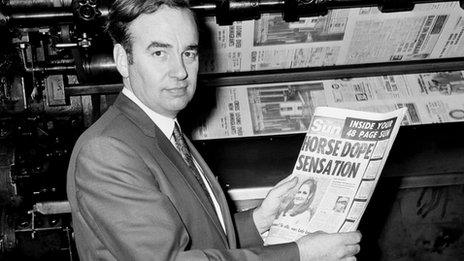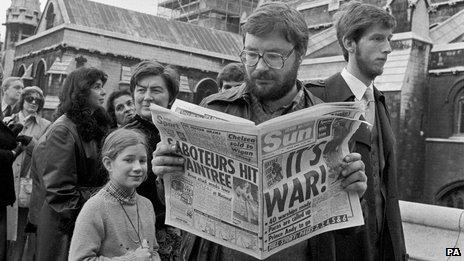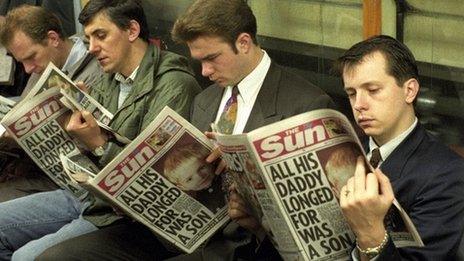The Sun: Medals, breasts, and now arrests
- Published

Rupert Murdoch is seen here holding one of the first copies of the Sun after he took it over in 1969
Love it or hate it, the Sun is a newspaper which refuses to be ignored.
Whether it is splashing memorable front-page headlines, flying in the face of convention by using topless models, or helping to raise funds for wounded soldiers, the paper is firmly entrenched in the UK public's consciousness - even for those who don't buy it.
Figures from 2011 show the paper had daily circulation figures of 2,725,323, by far the biggest of any daily UK newspaper.
Its life began on 15 September 1964, when the Daily Herald newspaper became the Sun, and it was initially printed in a broadsheet format.
Then on 17 November 1969, its new owner Rupert Murdoch relaunched the paper as a tabloid under the editorship of Larry Lamb.

The Falklands War in 1982 was announced in dramatic fashion by the Sun
The Scottish Sun launched in 1987, and there is also an Irish Sun. Six editions of the Sun were published in Polish in June 2008, under the name Polski Sun.
But back on 17 November 1970, exactly one year after the Sun's Murdoch-inspired relaunch, it printed its first fully topless Page 3 girl - 20-year-old German Stephanie Rahn - sparking a Fleet Street trend.
"I helped make page three part of the language," Mr Lamb wrote before he died in 2000. "In many ways now I wish I hadn't."
The debate about the effect Page 3 has on the image of women, external in the media and society in general has never gone away - one example being when Clare Short MP went to the Commons in 1986 to try to get it banned.
Her attempts failed and the debate flared up again, external when the paper got its first female editor, Rebekah Wade.
Political stance
The Sun remained a Labour paper throughout the 1970s but in 1979 it switched political allegiance and openly supported Margaret Thatcher with the headline Vote Tory This Time.
And on the day of the 1992 general election, when it again backed the Conservatives, it printed the headline If Kinnock Wins Today Will The Last Person To Leave Britain Please Turn Out The Lights, referring to then-Labour leader Neil Kinnock.

The Sun has the largest daily circulation of any UK daily newspaper
After the Conservatives won that election, the paper cheekily splashed with It's The Sun Wot Won It.
However, it was not the last time the paper would switch support.
In March 1997, it backed Labour six weeks before the general election victory which saw Tony Blair become prime minister with a substantial majority.
Its front page headline announcing its support read The Sun Backs Blair.
The paper held its allegiance to Labour until September 2009, when it announced that it would not back Labour at the following general election, external and that it favoured the Conservatives instead.
That election saw Labour ousted from power and the Tories enter parliament, albeit as part of a coalition with the Liberal Democrats.
Memorable headlines
Many of the Sun's headlines have stuck in the memory.
The news of the torpedoing of the Argentine ship the General Belgrano during the Falklands War in 1982 was greeted by the paper with the headline Gotcha. However, when the Argentine loss of life became clear, the headline was dropped for later editions.
Aside from the serious matters of war, it is perhaps testimony to the wit and ingenuity of the paper's headline writers that many of its front pages have stuck in the minds of the public.
Stop many adults in the street and they will recall the headline which was greeted with a mixture of laughter and incredulity back in 1986 - Freddie Starr Ate My Hamster.
The story alleged the British comedian had put a hamster between two slices of bread and eaten it. Mr Starr, in his 2001 autobiography, said the incident was a complete fabrication.
Hillsborough coverage
In 2004, after then-Prime Minister Tony Blair was hit by purple powder while speaking in the Commons by pro-hunting supporters, the Sun upheld its edgy reputation with the headline For Fox Sake.
However, at times the paper's coverage has sparked public anger.
On 19 April 1989, the Sun published a front page article claiming to have the real story about what happened during the Hillsborough stadium disaster, when 96 Liverpool fans were crushed to death during an FA Cup semi-final.
Called The Truth, the article quoted unnamed police to say "some fans" had urinated on the dead, pick-pocketed bodies and beaten up police officers giving the kiss of life.
But the article fuelled hatred of the paper in Liverpool, with sales plummeting on Merseyside, where ill feeling persists.
James Murdoch apologised in 2011 for the Sun's "wrong coverage" of the Hillsborough disaster.
Other headlines and their stories have got the paper into trouble. Elton John received a record £1m payout from the Sun in 1988 after it falsely accused him of sleeping with rent boys.
The paper faced internal strife in January 1986, when some 6,000 News International workers went on strike after Rupert Murdoch moved the Sun and the News of the World out of Fleet Street to a new site in Wapping.
The strike collapsed in February 1987, and Fleet Street - traditionally the home of the nation's main newspapers - would never be the same again. A year later, most of the country's national papers had moved out.
Military support
The Sun has been a passionate supporter of the nation's military. It runs an annual awards ceremony which honours members of the British armed forces and civilians involved with the forces.
The awards, known as the Millies, were created by Prince Charles and are organised and sponsored by the newspaper.
In June 2011 the Help for Heroes campaign, which is backed by the paper and receives regular coverage within its pages, passed more than £100m in funds raised for wounded service personnel.
However, in the same year, the Sun's sister paper - the News of the World - closed down after 168 years, following days of increasingly damaging allegations against the paper. It had been accused of hacking into the mobile phones of crime victims, celebrities and politicians.
It was still selling 2.8 million copies a week when it closed.
February 2012 has seen the Sun make headlines in other papers, with several of its journalists arrested over alleged corrupt payments to police and public servants.
- Published4 August 2012
- Published29 January 2012